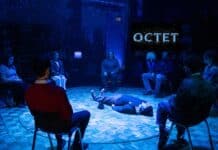“We’re in a crisis now”
President Donald Trump’s recent executive orders banning “discriminatory” diversity, equity, and inclusion (DEI) initiatives and “gender ideology” from federally funded arts projects, as well as his purge of the board of trustees of the Kennedy Center (making himself chairman) and the administration’s fierce crackdown on undocumented immigrants has raised alarms among arts organizations around the country. Theaters are especially vulnerable, as they often display diversity onstage and sometimes challenge cultural norms in highly visible ways. In the shadow of Congress and the White House, Washington-area theaters could face particular scrutiny.
“I certainly feel that we’re under a microscope,” says Jason Loewith, artistic director of Olney Theatre Center (OTC) and board chair of Theatre Washington, an alliance of Washington-area professional theaters best known for producing the Helen Hayes Awards. “Everybody in our community should be concerned because history tells us that this kind of chilling of a nation’s cultural dynamism happens over the course of years. It tends to be death by a thousand cuts, making it impossible for artists to provide their essential role, which is to question the status quo of the society in which they live.”

Loewith acknowledges some concern about the heightened scrutiny that could result from the new executive orders, citing an upcoming OTC world premiere of the musical Senior Class, which features a teen gay male character performing in a contemporary adaptation of George Bernard Shaw’s Pygmalion.
“We do not discriminate against anybody,” Loewith asserts. “We do not run afoul of any federal laws. But when the reviews come out, is somebody from the administration going to suddenly take a very strong look at Olney Theatre Center? Is somebody going to take it upon themselves to interpret what I do or what we do as illegal and call us to the mat, try to revoke our 501(c)(3) status? I mean, these things are scary.” Loewith says that the new executive order banning “discriminatory” DEI initiatives is dangerous precisely because it leaves the interpretation of what is considered discriminatory up to Trump and his administration.
Loewith’s colleague Amy Austin, president and CEO of Theatre Washington, describes the Kennedy Center realignment as having a “chilling” effect on artistic communities and their allies.
“It was a dramatic takeover,” Austin says. “It is shocking, not only for the people who work in the industry, but also for the audiences. People in DC are regular patrons of the Kennedy Center. They consider it their place.”
Austin cites the “unprecedented” nature of the changes at the Kennedy Center, whose leadership has traditionally striven to be bipartisan, with a range of political persuasions represented on its board of trustees. In February, President Trump removed Kennedy Center President Deborah Rutter and all board members not appointed by him. The current board members are all Republicans.
“What the arts can do is bring people together. This transformative power is not recognized in the reorganization of the board,” Austin asserts. “We live in the nation’s capital. We have this sense of ownership, that we are a place where supreme court judges see our work, where senators come together from across the aisle to be in the same theaters on the same night, that we host the nation’s capital and its citizens.” In addition to its convening power, Austin points to the Kennedy Center’s historic role in arts education, outreach, and accessibility. “It’s hard to imagine what the impact will be” on local as well as national theaters and audiences, she says. “COVID was a crisis for the performing arts industry. We’re in a different crisis now.”
Outgoing Woolly Mammoth Artistic Director Maria Manuela Goyanes says that, given the broad impact of Trump’s directives, she’s “nervous” for the city of Washington itself. “What you’re talking about here is more than theaters,” Goyanes says. “It’s the restaurants, it’s the schools, it’s the community centers. It’s all one ecosystem, and if the ecosystem is broken, it becomes hard for everybody.”
Goyanes notes that a sizable portion of Woolly Mammoth staff, as well as audience members, live in the District, a demographic Woolly shares with a number of Washington-based theaters. “My biggest concern is . . . that the changes to our industry can create a seismic shift for our communities,” she says, adding that the concern is exacerbated by the fact that DC is not a state and does not have the protections of a state. The mood “is different now,” she acknowledges, from when she took over the helm at Woolly in 2018, during the first Trump administration.
“When I arrived, Woolly and some of these other theaters felt like places of resistance and places where folks could feel safe, could feel like they could be brave together and talk together,” she recalls. “The kind of fear that lives now feels very different from that.” Goyanes worries that audiences may not want to come to downtown DC because of the fear that it is no longer a “safe,” inclusive, and culturally welcoming place. “I care deeply about DC and making sure that the folks who live here continue to feel like they have a safe community and a home at Woolly Mammoth.”
That concern is compounded for organizations like GALA Hispanic Theatre, whose mission is to promote and share ethnically focused (in this case, Latino) arts and culture.
“Just our name alone, GALA Hispanic Theatre, puts us in a different category already,” says Abel Lopez, associate producing director at GALA and also a board member of Theatre Washington. He observes that President Trump’s executive order making English the official language of the United States (for the first time) is especially problematic for a theater dedicated to producing Hispanic and Latino playwrights in their native language.
“It is another way to make us feel that we don’t belong, or that one doesn’t belong unless you speak or perform in English,” Lopez says. “So how that order is interpreted could affect us as well as our community.”
Lopez says he and GALA are especially concerned about the effects of the Trump administration’s new immigration crackdown and its invocation of an antique anti-immigration law from 1798 (the Alien and Sedition Acts) that has been challenged in the courts.
“There’s a fear in the community, not just for us [GALA], that it could become the norm to perceive and treat us differently as a class of people, as citizens, denied the protections we are entitled to under the Constitution,” Lopez says. “So, it’s not just about the impact on artists, but the audiences as well. This could affect them in terms of whether they decide to attend [a performance] or not. Or the kids who participate in our afterschool youth programs. How safe will they feel to come here?”
Given the demographics of GALA’s audiences and the fact that the theater is an anchor of the Latino community in DC’s Columbia Heights neighborhood, Lopez says the theater is providing information about what to do in the event of an ICE (U.S. Immigration and Customs Enforcement) raid nearby. (There is a large, busy, public gathering space immediately outside of GALA’s building.)
“We’ve been trying to educate people about what happens if you’re stopped because of what you look like or because you’re on the ‘team,’ so you have a plan of what to do if that happens,” Lopez explains. “So, we’re trying to help people become aware of their surroundings and know what are the safe spaces in the community that we can direct people to.”
Lopez says that the prospect of losing federal funding due to new administration guidelines, while a concern, is not the primary issue. “It’s about safety. How safe do [people] feel being perceived as an immigrant? We should all be concerned about any part of our community being excluded or limited because of what they look like or what language they speak.”
Ultimately, Lopez says, Trump’s moves — especially the order establishing English as the nation’s official language — are about culture: Whose it is, who controls it, and who is excluded from it.
Controlling the Narrative
When President Trump announced the “takeover” of the Kennedy Center in early February, he suggested that it would be the beginning of, or a return to, a “golden age of American arts and culture” under his leadership. Some arts leaders see that as Trump’s self-declaration as the nation’s new cultural arbiter. Others suggest it references something that has never existed at all.
“What does that mean, ‘a golden age of the arts’?” Amy Austin asks. “Every age is a golden age. The arts are constantly reinventing themselves, thinking of new ways of expression, finding new stories to tell, reexamining old stories. We produce Shakespeare, even though he’s hundreds of years old. I just saw Lin-Manuel Miranda’s In the Heights, which is 20 years old and relevant today. We’re always producing work that speaks to the time but isn’t necessarily of the time. If we’re trying to return to one specific ‘golden age,’ we’re in trouble right there.”
“In taking over the Kennedy Center, Trump is attempting to control the cultural narrative,” Jason Loewith argues. “But you can’t use the levers of government to do that. Artists need to do that. We work in a free marketplace of ideas, and over the decades I’ve been at this, not a lot of people on the Right decided that they wanted to become playwrights. Not my fault. So, tell them to go and become playwrights and change the culture that way. We’d have had a much healthier society over the past 10, 15, 20 years if there were more conservative voices who wanted to create art, but there weren’t. Where are they? Where have they been?”
Austin says that the suppression of the arts, such as she sees in the Kennedy Center realignment, “is not a new thing in the playbook. It’s common to want to control storytelling, to want to not have certain expressions seen and heard, because the arts bring people together. The objective now is to draw people apart.”
On his Truth Social account, President Trump cited drag shows and “other anti-American propaganda” as factors in his decision to take over the Kennedy Center, although it is estimated that the Center produced only two drag shows out of nearly 2,000 total productions last year. The aggressive moves against the Center are seen in some quarters as part of a larger campaign against LGBTQ+ rights.
“What is the pointing of fingers at LGBTQ identity about?” Austin asks. “That it’s somehow objectionable to have art that has an LGBTQ framework? This sort of thing [art with LGBTQ themes] isn’t new. But it’s antiquated in American culture to show such hatred and vehemence toward a drag show. It’s absurd that in 2025 we haven’t moved beyond it.”
One event originally planned for the Kennedy Center, and which will no longer take place there, is Decolonized Beatz Indigenous World Pride 2025. A gathering of “2SLGBTQIA+ Indigenous artists, performers, and storytellers,” the festival was set to take place from May 30 to June 1 before the Kennedy Center withdrew support following new guidelines from the president. According to Woolly Mammoth Associate Artistic Director and Director of Connectivity Kristen Jackson, Woolly was in conversation with the event organizer, Crushing Colonialism, about hosting part of Indigenous World Pride 2025 downtown at Woolly Mammoth. Crushing Colonialism has since found another venue for its event.
“[O]ur approach [was] to try to provide some of the same support that the Kennedy Center was going to provide them in terms of staffing and venue,” Jackson says, “but to allow them to be able to present their entire program, which they would not otherwise have been able to do.” The Decolonized Beatz event features some drag presentations.
(Other recent cancellations at the Kennedy Center include a performance by the Gay Men’s Chorus of Washington, which, like the Decolonized Beatz, was scheduled to perform at the Center as part of World Pride 2025. A number of other artists have voluntarily pulled out of scheduled Kennedy Center appearances since February, most notably, Lin-Manuel Miranda in Hamilton and actress and comedian Issa Rae. Hamilton had been scheduled to be a centerpiece of the Kennedy Center’s celebration of the 250th anniversary of American independence next year. Referencing the recent takeover of the Kennedy Center, Miranda and Hamilton producer Jeffrey Seller told the New York Times they would not participate in events at the nation’s arts venue “while it is the Trump Kennedy Center.”)
Woolly Artistic Director Maria Manuela Goyanes affirms her theater’s desire to “share a platform” with artists affected by the changes at the Kennedy Center, as well as those just looking for a home in destabilizing times.
“Whether they’re from out of town or locally based DC folks, we’re happy to provide a space where these kinds of works can still be seen,” Goyanes says, “because we believe there’s still an audience for it.”
Goyanes has issued an invitation to Kennedy Center staff, as well, whether laid off or voluntary departures. “There are fantastic people there with great skills whom we’d be lucky to have,” she says. “So, we really encourage them to come and see if there’s a place for them here.” To date, Goyanes says Woolly has had a number of inquiries from theater professionals around the DMV, including current and former Kennedy Center staff.
(On March 25, the Kennedy Center cut the majority of its Social Impact team, according to the Washington Post. The team is responsible for reaching new and more diverse audiences and works closely with the Center’s free Millennium Stage performances, which draw local as well as non-local audiences. According to the Post, at least ten Kennedy Center staff members have resigned since the February takeover, and more staff cuts are expected. Reached for comment, Theatre Washington President Amy Austin said in an email that the firing of the Center’s Social Impact team was “another clear sign that silencing voices is the objective. [The Social Impact team] were deeply connected to the local theatre community, and we are outraged by their dismissal.”)
While Woolly Mammoth has a long-established reputation for edginess and boundary-busting, perhaps giving it some insulation against, or at least familiarity with, periods of cultural and political realignment, Maria Goyanes acknowledges that many area theaters must, of necessity, remain more cautious.
“It’s a very different thing to be a theater [in DC] in the midst of all this,” Goyanes says. “I just want to send a lot of love and care towards those artists and those theater companies that are not [speaking out] because they’re doing so for a reason. They’re doing so to protect their art, their own artists, and their own staff. If you’re a culturally specific organization, especially, it’s just very, very tricky.” (A handful of Washington-area professional theaters declined to comment for this article.)
A Call to Action
While many theaters are exercising caution in the face of the new Trump initiatives, in some cases, to protect funding and avoid alienating audiences, advocacy efforts have begun on both local and national levels. March 24 to 31 was National Theatre Advocacy Week, sponsored by the Theatre Communications Group (TCG) and involving workshops, seminars, and a variety of virtual and in-person events. “As theatres across the country navigate policy shifts and critical funding challenges, collective advocacy has never been more necessary,” TCG spokesperson Alisha Tonsic said in a statement.
Locally, one of the first “calls to arms” was issued by OTC’s Jason Loewith at the Victor Shargai Leadership Award ceremony in February, shortly after the dramatic realignment at the Kennedy Center. In a speech, Loewith quoted President John F. Kennedy on the essential function of the artist as social critic and called upon area theater artists to collectively “fight for our country’s artistic soul.” In a later interview, Loewith stressed that “collective action is going to be essential to move us forward because, otherwise, the opposition will be delighted if we only respond as one whiny arts group at a time.” Loewith suggests that arts groups state the case for their importance, rather than allow themselves to be seen as victims who are always begging for public support. “We need to throw out the playbook of ‘You can’t take my money away,’ of always whining about money,” he says. “We need to be flipping the script. It’s the others who are the elites. We are the oppressed workers. And the fear is, will they try to take away our First Amendment rights?”
Amy Austin says that Theatre Washington can be an important vehicle for bringing the voices of DC-area artists and theater companies together, especially now. “What we saw with the Kennedy Center was a bell toll, right? We can see what’s coming ahead. So this is where we start.” Austin describes Theatre Washington as a “centering body” that can convene conversations among theaters, artists, and audiences to organize direct, concerted action in response to the Trump administration’s moves. “We can bring people together around shared concerns,” Austin says. “We have an extraordinarily talented and nationally recognized, impactful theatre community here that cares about the full ecosystem — including the Kennedy Center.”
In his role as board chair, Loewith says Theatre Washington is convening area performing arts companies that are, or are expected to be, National Endowment for the Arts (NEA) grantees to talk about what the new federal exclusions around DEI and “gender ideology” mean for them. There is concern in the community that some federal funding could be lost. (Since the interview with Loewith was conducted, the American Civil Liberties Union won a lawsuit against the NEA, requiring the federal agency to remove the mandate that artists attest they will not “promote gender ideology” in order to apply for and receive funding.)
Loewith, like his theater counterparts, argues that, in this time of heightened scrutiny and regulation, theaters need to stay focused on their vision and continue doing the work. “It’s very easy in the heat of the moment, and given the speed with which this administration is moving, to become alarmed and think the end days are near,” Loewith says. “What we need to remember is that significant change doesn’t happen overnight. The Civil Rights Act of 1964 didn’t just happen because a bunch of legislators decided it was time; the desegregation of DC theaters didn’t just suddenly happen. It happened because in 1948, Helen Hayes refused to bring [a play] to the National Theatre because they wouldn’t desegregate. These ‘great reckonings in little rooms’ add up over time, they make a difference.”
Loewith contends that, especially now, theaters and theater artists need to remember that, in the long run, “politics follows where culture leads, and not the other way around.” Highlighting diversity and representation on DC-area stages and around the country will bear fruit over time, regardless of the policies of any political administration. “It’s successful because people see themselves onstage, sometimes for the first time,” Loewith says. “And then the person next to them sees themselves onstage. Continuing to emphasize visibility and representation is the most important thing we can do right now.”
And Loewith has a final warning for artists and theater makers who would rely on policy and legislation to move their priorities forward rather than the art itself. “When you lead with politics, you don’t invite everybody into your room,” Loewith reflects. “And we have to be inviting everyone into the room, all the time.”



